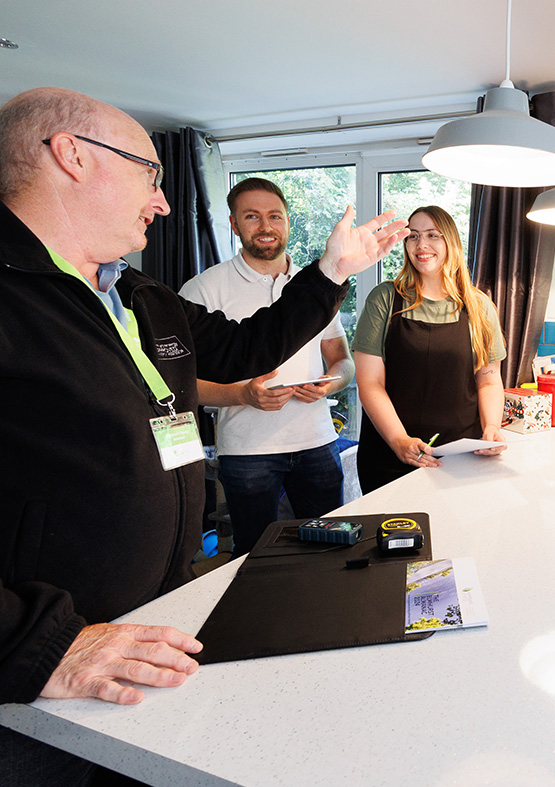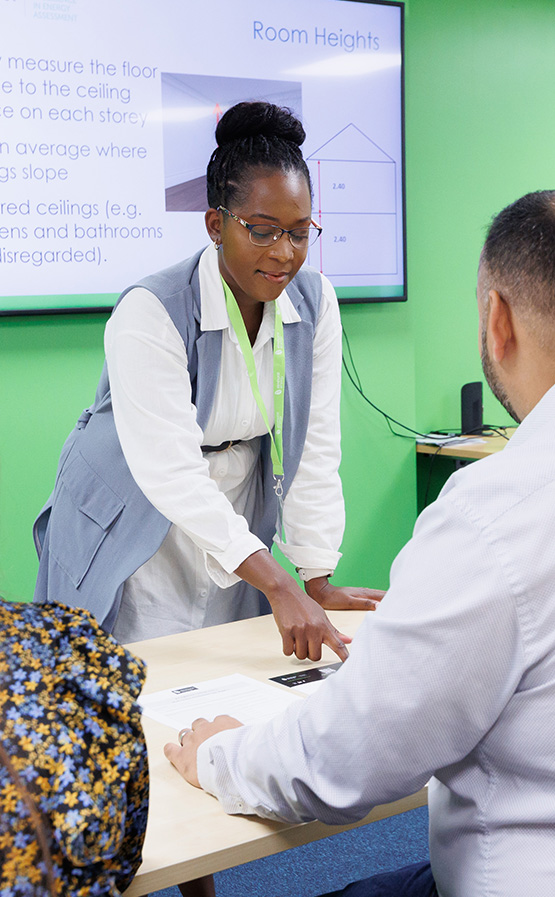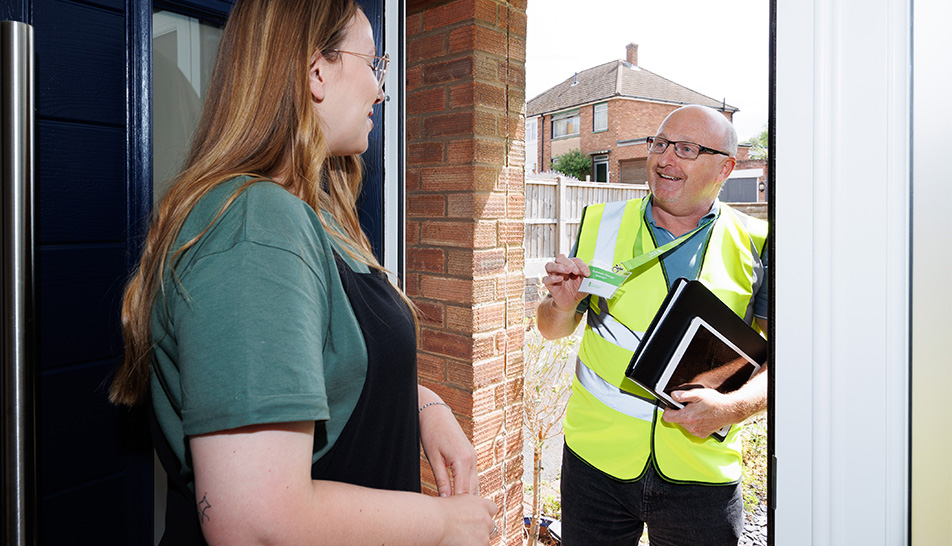Elmhurst’s ABBE qualification course provides a fantastic opportunity for those either completely new to or familiar with the world of energy assessment, to become a fully qualified Domestic Energy Assessor (DEA).
✅ Learn how to produce Energy Performance Certificates for existing houses, flats and bungalows.
✅ Play a critical role in the drive towards net zero.
✅ Work for yourself – control your work/life balance.
✅ Supplement your existing income, or build a completely new business.
✅ Seek employment opportunities with existing energy assessment firms and other organisations.
ABBE Domestic Energy Assessor (DEA) Training
Elmhurst’s ABBE Level 3 Domestic Energy Assessor (DEA) training offers you the flexibility to learn in the way that suits you best.
Opt for our Remote/Online Training to enjoy the course from the comfort of your home or office, delivered live by our expert trainers for an interactive learning experience.
£950 + Reg Fee + VAT
Alternatively, choose our Classroom Training for face-to-face tuition and support. This traditional learning setting includes guided property visits, offering a comprehensive training experience.
£1650 + Reg Fee + VAT
GO TO ONLINE COURSE > GO TO CLASSROOM COURSE >
What do Domestic Energy Assessors do?
Domestic Energy Assessors (DEAs) will assess the energy efficiency of existing residential buildings (houses, bungalows and flats) in the UK. Their work is completed on site and is considered to be non-invasive (no drilling into walls required).
A domestic energy assessment can take anywhere between 30 minutes and a few hours to complete, depending on the property size and complexity, and will involve collecting information on the property (such as property age, type of windows, type of heating systems, insulation etc), alongside photographic evidence and a floor plan.
This information will be entered in to specialist software (RdSAP), which will provide an energy efficiency rating and produce an Energy Performance Certificate (EPC).
DEAs may also be expected to explain their findings to property owners, and advise them on ways to improve their energy efficiency using the measures recommended on the EPC.
Interested to see what a typical day might look like for a Domestic Energy Assessor? Watch below:

Our Training Quality Promise to you
Quality lies at the heart of what we do, and it all starts with the training that we offer. We strive to equip individuals with the skills and knowledge required to deliver quality energy assessment services. In a constantly evolving industry, staying current is key. Our close ties with the sector ensure our courses remain relevant and up to date, offering you knowledge that’s not only timely but timeless.
✅ Expertise – our trainers are fully qualified and come with invaluable industry experience
✅Adaptability – we’re always fine tuning our courses based on your feedback
✅ Personalised support – guidance that is tailored to your pace making learning with us as individual as you are
✅ Transparent Pricing – our all-inclusive pricing means you focus on learning, not fees
✅ Qualify with confidence – complete your course ready to tackle the industry and your role head-on, armed with practical skills and real-world knowledge
✅ Support beyond training – As the UK’s largest government approved energy assessor scheme, we can provide technical support to you, not only during your training, but also into your career
Why choose Elmhurst for Domestic Energy Assessor (DEA) Training?
We know there’s a lot of choice when it comes to choosing a training provider for your Retrofit Coordinator training, but we’re confident in our ability to deliver the best quality training in our industry.
Take a look at what you get when you choose to train with Elmhurst:
| Elmhurst Energy | Other Training Providers |
|
| Multi award winning training provider | ✔ | ❌ |
| 30 Years Industry Experience | ✔ | ❌ |
| Course content developed with real-world feedback from industry | ✔ | ❌ |
| Bespoke training | ✔ | ✔ |
| UK’s largest technical support team in the industry | ✔ | ❌ |
| Dedicated customer service team, just for training | ✔ | ❌ |
VIEW FULL COMPARISON TABLE >
Frequently Asked Questions
No specific qualifications or previous experience is required in order to become a DEA.
An interest in building/construction, and good math skills can certainly help anyone to succeed as a DEA- however it is by no means essential.
Trades already working within houses/buildings, may also find it easier to adapt to this particular profession.
DEAs can earn anywhere between £18,000 and £35,000 depending on their experience. There is even evidence of organisations offering more than £35,000 for an in house DEA.
For those who choose to work self-employed, What they earn will depend on a number of different factors, such as the level of local competition, the frequency of assessments, as well as the size and complexity of the properties they are assessing.
DEAs do not require too much equipment when it comes to undertaking their assessments. The basic equipment which an individual will need includes:
- Large Tape Measure or Laser measure for measuring room dimensions
- Step Ladder, required to access a loft
- Pen, pencil, paper/notepad and ruler which you can use to draw floor plans and note down assessment info
- Access to a computer for inputting information into RdSAP calculation software
- Camera or smart phone/tablet to take pictures for evidence
We would strongly recommend using a smart phone or tablet for your assessments, as Elmhurst’s RdSAP Go software will allow you to capture the relevant information and photos on site which will save you valuable time.
DEAs will need to visit properties in person, in order to adequately assess them.
Having access to a vehicle can certainly help a DEA deliver services to a broader region, and will also help to transport their equipment.
Anyone selling or renting out their properties are required to have an EPC. These will typically be landlords and estate agents.
Local Authorities and Housing Association will also own housing (social homes) which will often need assessment.
Government policies may also require the need for an EPC.
Training will take either 3 or 5 days, dependent on the delivery method, and will give you a solid understanding of the role.
Once concluded you will likely need to undertake on site assessments and test questions in order to complete your professional portfolio (required for qualification).
The process to becoming fully qualified can take as little as 2 weeks, but can sometimes take up to 6 weeks dependent on the scenario.
The demand for qualified Domestic Energy Assessors continues to increase, as the government aims to improve the energy efficiency of existing homes (stimulated by new regulation and standards)
This has resulted in more job opportunities within the industry, from estate agents, surveying firms, solicitors and even local authorities. Some of these opportunities can be viewed on Elmhurst’s opportunities page as well as on online job boards.
Alternatively, qualified DEAs also have the option to set up their own energy assessment practice, as a self employed energy professional.
In order for a DEA to produce a legally valid EPC, they must be accredited with a government approved energy assessment scheme- such as Elmhurst.
Accreditation schemes are there to support members in their practice, by providing them with ongoing technical guidance, training and software. They are also required to monitor the work of DEAs through regular auditing- this ensures quality within the industry.

Become a Member with Elmhurst
Once qualified as a DEA, you will be eligible to join Elmhurst’s industry leading accreditation scheme, free of charge.
If you are looking for a scheme which offers competitive lodgement fees, market leading software, professional technical support, opportunities to enhance your skills, as well as the tools to build a competitive business, then Elmhurst Energy is the accreditation scheme for you.
FIND OUT MORE >


